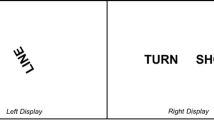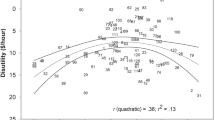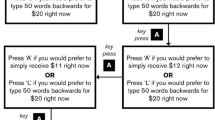Abstract
The present study examined the hypothesis that effort intensity moderates the relationship between affect and time perception by employing more academic-related tasks and conditions. Two experiments were conducted to address the question. In Experiment 1, 139 adults (68 women; Mage = 23.7, SD = 3.2) were randomly assigned to one of six conditions (2 [time estimation paradigm] × 3 [task nature]) and worked on a computerized task for 6 minutes. In Experiment 2, 73 participants (35 women; Mage = 26.1, SD = 4.3) were randomly assigned to one of four conditions (2 ([time estimation paradigm] × 2 [task nature]) and completed both tasks for 6 minutes. Multiple moderator models were used to analyze multiple factors simultaneously in the data analysis for each experiment. Across two experiments, multiple moderator models revealed that a) enjoyment of the task was essential to perceive time passing faster regardless of different tasks and the effort level and b) the relationship between task enjoyment and the perceived speed of time was moderated by perceived effort. The findings of the study indicate that task nature and the effort level should be considered simultaneously to understand the relationship between task enjoyment and time perception in the ecologically valid situation.



Similar content being viewed by others
Notes
Based on the results of Experiment 1, Experiment 2 focused on the perceived speed of time.
Participants assigned to the retrospective timing condition (n = 37) would know that after completing the first task, they were going to be asked to estimate time in the second task. For both of reading and cognitive tasks, the perceived speed of time were similar between the two groups with the different task order (Group 1: reading ➔ cognitive test; Group 2: cognitive test ➔ reading): reading: M = 5.44, SD = 2.6 for Group 1, M = 6.21, SD = 2.8 for Group 2; cognitive test: M = 5.67, SD = 2.6 for Group 1, M = 5.11, SD = 2.9 for Group 2). For both tasks, no significant difference was observed in the perceived speed of time between the two groups (reading: t[35] = −.862, p = .395; cognitive test: t[35] = .612, p = .544).
References
Bisson, N., Tobin, S., & Grondin, S. (2012). Prospective and retrospective time estimates of children: A comparison based on ecological tasks. PLoS ONE, 7, e33049. https://doi.org/10.1371/journal.pone.0033049
Block, R. A., & Zakay, D. (1997). Prospective and retrospective duration judgments: A meta-analytic review. Psychonomic Bulletin & Review, 4, 184–197.
Cohen, J. (1992). A power primer. Psychological Bulletin, 112, 155–159.
Coull, J. T., Vidal, F., Nazarian, B., & Macar, F. (2004). Functional anatomy of the attentional modulation of time estimation. Science, 303, 1506–1508.
Deci, E. L., & Ryan, R. M. (1985). Intrinsic motivation and self-determination in human behavior. Plenum.
Diener, E., Emmons, R., Larsen, R., & Griffin, S. (1985). The satisfaction with like scale. Journal of Personality Assessment, 49, 71–75.
Droit-Volet, S., & Meck, W. H. (2007). How emotions colour our perception of time. Trends in Cognitive Sciences, 11, 504–513.
Droit-Volet, S., & Wearden, J. (2002). Speeding up an internal clock in children? Effects of visual flicker on subjective duration. The Quarterly Journal of Experimental Psychology, 55B, 193–211.
Elliot, A. J. (2006). The hierarchical model of approach-avoidance motivation. Motivation and Emotion, 30, 111–116.
Elliot, A. J., & Murayama, K. (2008). On the measurement of achievement goals: Critique, illustration, and application. Journal of Educational Psychology, 100, 613–628.
Faul, F., Erdfelder, E., Lang, A. G., & Buchner, A. (2007). G*power 3: A flexible statistical power analysis program for the social, behavioral, and biomedical sciences. Behavior Research Methods, 39, 175–191.
Gable, P. A., & Harmon-Jones, E. (2010). The motivational dimensional model of affect: Implications for breadth of attention, memory, and cognitive categorisation. Cognition & Emotion, 24, 322–337.
Gable, P. A., & Poole, B. D. (2012). Time flies when you’re having approach-motivated fun: Effects of motivational intensity on time perception. Psychological Science, 23, 879–886.
Gendolla, G. H. E., Wright, R. A., & Richter, M. (2012). Effort intensity: Some insights from the cardiovascular system. In R. M. Ryan (Ed.), The Oxford handbook of human motivation (pp. 420–438). Oxford University Press.
Gosling, S. D., Rentfrow, P. J., & Swann, W. B. (2003). A very brief measure of the big-five personality domains. Journal of Research in Personality, 37, 504–528.
Grondin, S. (2001). From physical time to the first and second moments of psychological time. Psychological Bulletin, 127, 22–44.
Grondin, S. (2010). Timing and time perception: A review of recent behavioral and neuroscience findings. Attention, Perception, & Psychophysics, 72, 561–582.
Gupta, R. (2022). Motivational salience, not valence, modulates time perception. Emotion, 22, 283–291.
Hayes, A. F. (2013). Introduction to mediation, moderation, and conditional process analysis: A regression-based approach. Guilford Press.
Inquisit 4 [Computer software]. (2014). Retrieved from https://www.millisecond.com. Accessed 7 Jan
Jang, H., Reeve, J., & Deci, E. L. (2010). Engaging students in learning activities: It is not autonomy support or structure but autonomy support and structure. Journal of Educational Psychology, 102, 588–600.
Liu, J., & Li, H. (2020). How individuals perceive time in an anxious state: The mediating effect of attentional bias. Emotion, 20, 761–772.
Matthews, W. J., & Meck, W. H. (2014). Time perception: The bad news and the good. Wiley Interdisciplinary Reviews: Cognitive Science, 5, 429–446.
Ryan, R. M. (1982). Control and information in the intrapersonal sphere: An extension of cognitive evaluation theory. Journal of Personality and Social Psychology, 43, 450–461.
Ryan, R. M., & Frederick, C. M. (1997). On energy, personality and health: Subjective vitality as a dynamic reflection of well-being. Journal of Personality, 65, 529–565.
Sackett, A. M., Meyvis, T., Nelson, L. D., Converse, B. A., & Sackett, A. L. (2010). You’re having fun when time flies: The hedonic consequences of subjective time perception. Psychological Science, 21, 111–117.
Science Editor’s Summary: Time is a subjective experience. (2016). Science, 354, 1278.
Soares, S., Atallah, B. V., & Paton, J. J. (2016). Midbrain dopamine neurons control judgement of time. Science, 354, 1273–1277.
Stroop, J. R. (1935). Studies of interference in serial verbal reactions. Journal of Experimental Psychology, 18, 643–662.
Tobin, S., & Grondin, S. (2009). Video games and the perception of very long durations by adolescents. Computers in Human Behavior, 25, 554–559.
Uusberg, A., Naar, R., Tamm, M., Kreegipuu, K., & Gross, J. J. (2018). Bending time: The role of affective appraisal in time perception. Emotion, 18, 1174–1188.
Watson, D., Clark, L. A., & Tellegen, A. (1988). Development and validation of brief measures of positive and negative affect: The PANAS scales. Journal of Personality and Social Psychology, 54, 1063–1070.
Acknowledgements
The present study was funded by National Institute of Education (NIE), Nanyang Technological University, Singapore (Project No.: RI 10/12 MK; OER 24/15 MK). The views expressed in this paper are the authors’ and do not necessarily represent the views of NIE. Authors are grateful to Khai Leng Chua and Rachel Evans for the data collection. Parts of this paper were presented at the 6th International Conference on Self-Determination Theory (June 2016) and the 7th Complexity Conference (March 2018).
Nikos L. D. Chatzisarantis was with Curtin University, Australia when the study was conducted. He was an internationally renowned researcher in the field of exercise and health psychology. Very sadly, he passed away in May 2020. His great contributions to the field are indelible.
Author information
Authors and Affiliations
Corresponding author
Ethics declarations
Conflict of Interest
The authors declare that the research was conducted in the absence of any commercial or financial relationships that could be construed as a potential conflict of interest.
Data Accessibility Statement
The datasets used and/or analyzed during the current study will be available from authors on reasonable request.
Additional information
Publisher’s note
Springer Nature remains neutral with regard to jurisdictional claims in published maps and institutional affiliations.
Supplementary information
ESM 1
(DOCX 171 kb)
Rights and permissions
About this article
Cite this article
Kawabata, M., Chatzisarantis, N.L.D. Does time fly when you engage more? Effort intensity moderates the relationship between affect and time perception. Curr Psychol 42, 20814–20823 (2023). https://doi.org/10.1007/s12144-022-03191-y
Accepted:
Published:
Issue Date:
DOI: https://doi.org/10.1007/s12144-022-03191-y




